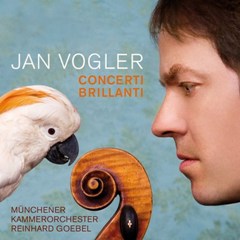Concerti Brillanti (Jan Vogler) [2007]
Concerti Brillanti (Jan Vogler) [2007]

Carl Philipp Emanuel Bach - Concerto for Violoncello and Strings in A major, Wq 172 1 Allegro 6:12 2 Largo 6:46 3 Allegro assai 5:07 Friedrich Hartmann Graf - Concerto for Violoncello and Orchestra in D major 4 Allegro 8:42 5 Romance. Andante 3:59 6 Rondo. Allegro 6:02 Johann Adolf Hasse - Concerto for Violoncello and Strings in D major 7 Andante moderato 7:03 8 Largo 3:02 9 Allegro 4:12 Michael Haydn - Concerto for Violoncello and Orchetra in B flat major 10 Moderato 14:23 11 Romanze. Andante, un poco agitato 5:14 12 Finale. Rondo 6:16 Jan Vogler – Cello Münchener Kammerorchester Reinhard Goebel – conductor
The giant Sony Classical label was an odd home for this 2007 recording of cello concertos of the 18th century, but that in no way diminishes its quality. Cellist Jan Vogler plays four concertos that span the second half of the century, and three of them are world premieres; even the sole item existing on recordings, the Cello Concerto in A major, Wq 172, of Carl Philipp Emanuel Bach, is by no means a common item. The originality of the repertoire is likely the work of veteran German Bach conductor Reinhard Goebel, who leads the Munich Chamber Orchestra and contributes a fuzzy set of booklet notes. A chronological ordering of the works, with the concerto by Augsburg composer Friedrich Hartmann Graf placed third, might have been helpful. But all the music has the happy combination of obscurity and value. The album's Concerti Brillanti title might suggest showpiece works in the manner of Tartini or one of the other mid-century violin virtuosi, but that gives the wrong idea; the music is ambitious rather than brilliant. The totally unknown Graf concerto is a pleasure from beginning to end; its spacious opening movement with Mozartian space for winds in the tutti, progressive Romance slow movement, and startling finale theme built from harmonics is a pleasure from beginning to end. The concluding concerto attributed to Michael Haydn may in fact be by someone else, but whatever the case it has a Mozartian combination of instrumental idiom and subtle large-scale structure. That work is the most challenging for soloist Jan Vogler, whose playing is lyrical and confident throughout. Goebel, for his part, avoids the severe tone that so many Baroque conductors bring to Classical-era music. The Cello Concerto in D major by Johann Adolph Hasse, the preeminent German opera composer of the middle 18th century, does not simply substitute the cello for a singer, but has a mix of Baroque and Classical characteristics, with an Andante opening movement serving as an extended introduction to a fugue. All four works show composers working out the still-new concerto form as musical language changed and trying to get away from the overwhelming influence of Vivaldi and Bach; all are lively works that expand the always sparse cello concerto repertory. Recommended for any lover of music of the 18th century. ---James Manheim, Rovi
download: uploaded anonfiles yandex 4shared solidfiles mediafire mega filecloudio
Zmieniony (Sobota, 12 Październik 2013 12:59)








